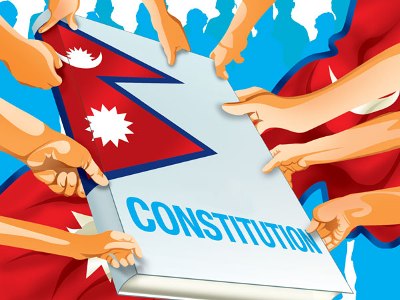Economic disparity in Federal States needs action (Nepalekhabar Speical)
 Kathmandu: The new constitution has divided the country in seven Federal States but questions are being raised about the economic sustainability of these states.
Kathmandu: The new constitution has divided the country in seven Federal States but questions are being raised about the economic sustainability of these states.
Experts have opined there are economic disparities in these federal states as some states have more districts and more economically developed International Day of the Girl Child being celebrated; UNFPA says investing in girls yields huge returns and economically viable areas while some states have a very few, which in the long run may create financial disparities.
Economist Keshav Prasad Acharya, who had worked in Nepal Rastra Bank – Central Bank of the country – informs that the major parties failed to divide the federal states taking into consideration the economic prospects and instead divided it on the basis of geography. He further adds that this has happened as the political parties failed to take into consideration geographic, economic, social, cultural and natural resources while dividing the federal states. Rather than adopting scientific criteria, the political parties divided the federal states based on their political interests.
Economist and former vice chairperson of the National Planning Commission Dipendra Bahadur Chhetri adds that unscientific division of states may add challenges in the future as some economically poor areas are being made into a state. According to Chhetri, it will be very difficult for State number 6 (Far Western region) in the coming some years as this state is economically poor as compared to others.
Experts say that the political parties should have considered the major custom points, industries, tourism potential, water resources, road networks and productivity of the land among others while dividing the states as it will have long term impact in national development. The current division will bring about long term implication and problems in the states.
As per the current division of the states, the Kathmandu Province looks very strong as it covers the area from the capital Kathmandu to Chitwan. This province has many industries, trade routes and is much more developed compared to other parts of the country. According to experts, the Far Western State, which covers many districts, is the weakest one despite the state having some natural resources and water resources as it will take a long time to develop these potentials.
According to experts, the state number 1 and 4 are also weak from the economic perspective. According to them, these states have less industrial infrastructure and other sources to make income. Experts have opined that the state number 2 and 5 are good and these states have good potential for economic development.
As per current delineation of states, State number 1 has districts like Taplejung, Pachthar, Ilam, Sankhuwasabha, Therathum, Dhankuta, Khotang, Solukhumbu, Okhaldhunga, Udypur, Jhapa, Morang and Sunsari. Similarly the State number 2 comprises Saptari, Siraha, Dhanusa, Mahottari, Sarlahi, Rautahat, Bara and Parsa. The 3rd state has Dolakha, Ramechap, Sindhuli, Kavrepalanchow, Sindhupalchowk, Rasuwa, Nuwakot, Dhading, Chitwan, Makawanput, Bhaktapur, Lalitpur and Kathmandu districts.
Gorkha, Lamjung, Tanahu, Kaski, Manang, Mustang, Parwat, Syanja, Myagdi, Baglung and Nawalparasi districts are in state number 4, while Rupandehi, Kapilbastu, Palpa, Arghakhanchi, Gulmi, Baglung, Rolpa, Pyuthan, Dang, Banke and Bardiya districts are in state number 5. State number 6 comprises Surkhet, Salyan, Jajarkot, Rukum, Kalikot, Dolpa, Jumla, Mugu, Dailekh and Bajhang. Similarly Kailali, Kanchanpur, Doti, Dadeldhura, Achham, Baitadi, Bajura and Darchula fall in state Number 7.
As per the geographical division, all states are connected to the southern border, while only four states are connected with the northern border. It means three states that border India will be dependent on only India for import of goods. The political parties should adopt special measures for equal development of all states. Support from experts could be taken to address the issue otherwise it will have implications for the long run. The issue should be resolved by amending the new constitution or by providing special measures to narrow down the disparity among the federal states.
